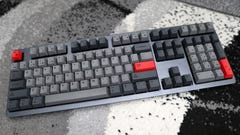System Shock review - SHODAN steals the show in this faithful remake
Who says AI can't be funny?
As a newcomer to System Shock, I'd like to take a moment and declare my undying love for SHODAN, aka Sentient Hyper-Optimised Data Access Network, aka the murderous AI villain who engulfs the entire remake. Literally. As a captured hacker onboard the Citadel space station, you've been asked to remove the "ethical constraints" from the station's artificial intelligence (that's SHODAN) in an obviously shady exchange. You get back your freedom plus a cool cybernetic implant, and the megacorp executive who's in charge of the operation gets to do evil things with the new ethically unconstrained station.
Things don't work out for either of you. Months pass by and you've woken up, still on the Citadel, but this time the humans have turned into bloodthirsty mutants, killer robots and cyborgs attack with a vengeance, and my beloved SHODAN runs the whole bleak party.
The System Shock remake begins in much the same way as 1994's original game. Exactly the same events take place, but they've been rejigged. The opening cutscene to the original System Shock has this noisy, head-bopping beat playing in the background. The retro animation was kind of surreal, almost like it was straight out of a fever dream. The remake blunts some of that energy in exchange for something more palatable.
I'm focusing on the introduction because I think it's emblematic of the entire remake. Developer Nightdive's updated System Shock is a very faithful remake - sometimes shockingly so - recreating much of the Citadel's zig-zagging layout as it was three decades ago, but the original's somewhat intimidating quirks have been ironed out, replaced, or straight-up removed. That faithfulness means that System Shock (2023) doesn't quite stand up next to the many great games that System Shock (1994) inspired. Though it does mean that the classic's pleasures are now easier to enjoy than ever, made more approachable for a modern audience.
The overall structure here is the same, though. After adjusting a few difficulty sliders for combat, puzzles, cyberspace, and more - as you did in the original - you start the trek through the Citadel's steely levels in an attempt to thwart SHODAN's humanity-cleansing schemes. Emphasis on the plural, SHODAN's a crafty one. Sneaking under crawl spaces and across the labyrinthine corridors, you'll hop to destroy SHODAN's cameras, find access cards, flip switches to unlock newer areas, and eventually make your way up and back down the station's various floors. You're slowly unravelling and learning about these knotted environments as you go.
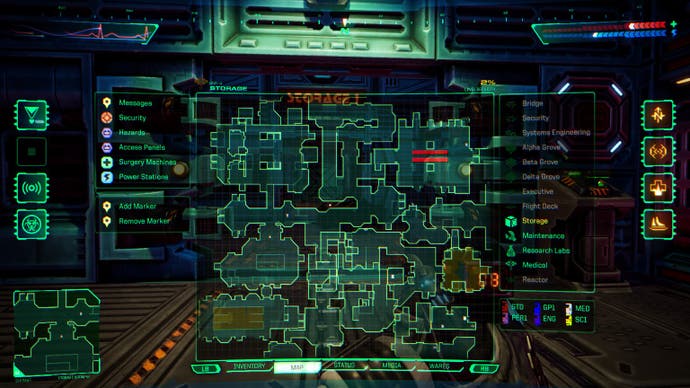
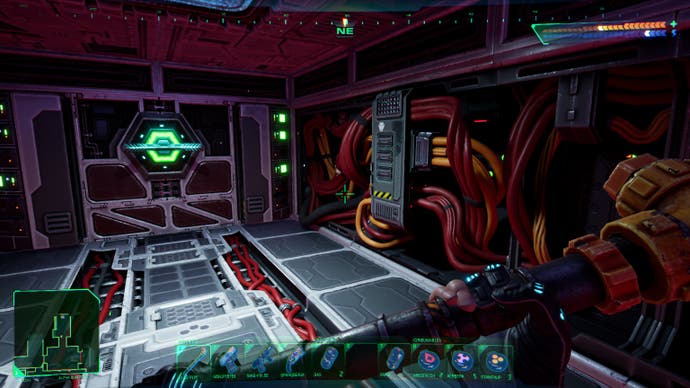
The first change that's immediately noticeable is, of course, how the Citadel looks this time around. Or rather how it feels. System Shock remake's environments have a decidedly darker, scarier look than they did in the original. Some walls still have a few blocky pixelated textures, recapturing that retro charm. So even when the remake isn't striving for realism, it still looks damn cool. Regardless, thick shadows, silvery pipes, and abrupt corners are everywhere in the System Shock remake, leaning into that horror-adjacent atmosphere very effectively.
Sound effects largely help with this as well. Taking a page out of Dead Space's blood-soaked book, you're never quite sure whether or not distant groanings are coming from the station's creaking parts, the grunts of nearby enemies, or your computer slowly overheating. The sometimes ear-splitting soundtrack is gone too, replaced by quieter ambient beats that incorporate a lot of clicking, clacking, and thumping synths - because it wouldn't be cyberpunk without thumping synths. And the end effect makes you stop, turn, peek out of corners, second-guess if you're truly alone in a room.
Even a run-in with the tutorial enemies - the hollow-eyed mutants - can be terrifying thanks to their inhuman stares. Most combat encounters actually instil a sense of fear thanks to tight resources and an even tighter inventory - which is on double-duty with Tetris-management. System Shock remake's shooting and whacking have been brought up to snuff and feel more like a modern shooter, but your general lack of supplies adds a tinge of survival horror scrambling. Cautiously matching the right bullets with the right foe can make all the difference, and your future self will thank you for saving ammo.
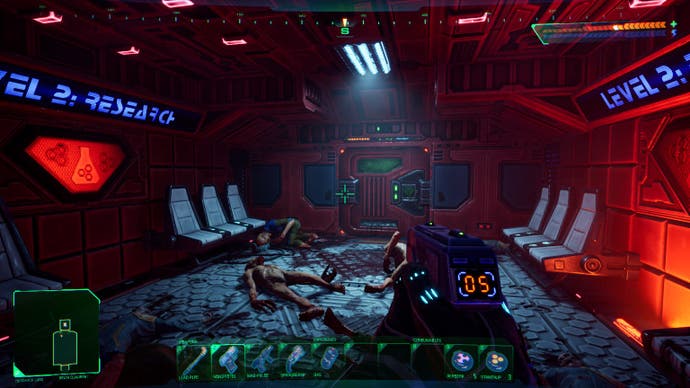
My inventory was usually lacking in either ammo, health-restoring items, or grenades, but never all three. So, as an immersive sim, there's normally a scrappy way out of difficult situations. Running low on ammo? Just chuck an EMP grenade at your foes, disable them, and run up with your wrench until they break apart. Combat almost always has you on the back foot, but this desperation can inspire clever thinking (or clever cheesing) and lead to some massive sighs of relief. Just how I like my horror.
Last-ditch struggles are right in line with the game's tone, but compared to other modern immersive sims, combat can occasionally come across as stilted. You're not given the plethora of options you might expect from an Arkane game, for example, so once you're fully loaded on supplies, a lot of encounters devolve into long-distance shootouts. Which is all well and good, though it doesn't inspire the consistent creative problem-solving that truly makes an im-sim sing.
Those im-sim-isms do come out to play in the way you discover and chart the maze-like world, happily. Most levels are a series of interwinding corridors and you're pretty much free to tackle these knots from any direction. Naturally, plenty of doors have been locked, either by SHODAN, faulty wiring, or a lack of access cards, and the remake trusts you to detangle everything. Seriously, a complete map of any level resembles what I imagine Area 51 floor plans look like.
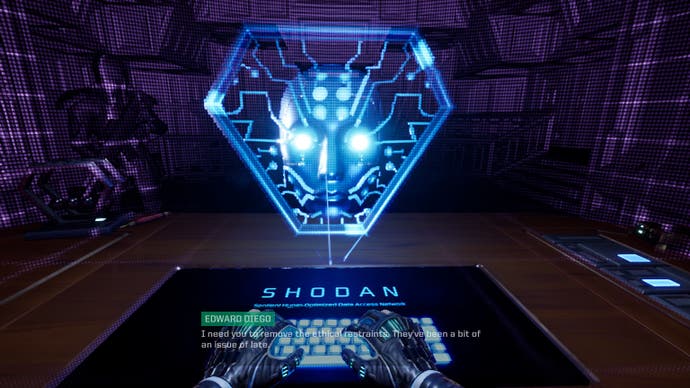
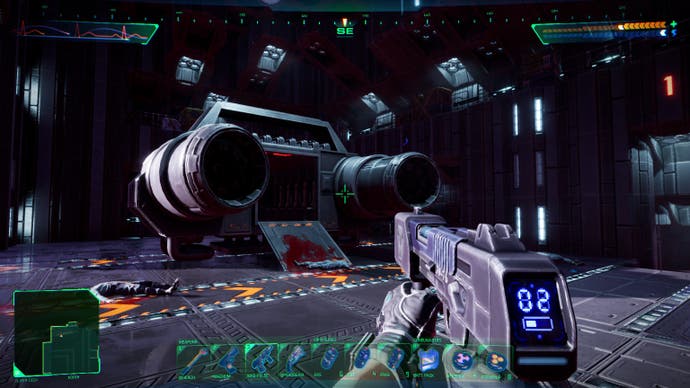
That freedom leads to plenty of satisfying a-ha moments. While you can't chain stealth kills or throw out plasmids, you can find a way to disable respawning drones. Or maybe you want to prioritise unlocking the level's respawn point for yourself. Or perhaps you want to find a crawlspace to side-step a precise enemy completely. The game gives you plenty of freedom in the order that you tackle objectives, opening up opportunities for decisions and discoveries, big and small.
System Shock remake's structure is largely unchanged from the original, and (again) this can be freeing, yet some of those vague objectives usher in annoyance. You see, progress is regularly tied to access cards, levers in specific rooms, and other items of interest but the game rarely puts special focus on these. So I'm split between loving the process of deciphering objectives through environmental cues and emails, and feeling frustrated when running laps around indistinguishable corridors, only to finally find my key on the body of a long-dead enemy.
Oh, and cyberspace is back. These were the abstract areas in the original where you'd float through a confusing space and shoot at colourful shapes. Now, they're neon-tinged abstract areas where you shoot at colourful angry faces. They're a fun and unexpected distraction, and while these shootouts aren't the highlight, I'm glad they're still around. Cyberspace is odd and helps this remake retain some of that weirdness from the original. Actually, come to think of it, there are a lot of weird things here - from the mutants moaning "I'm hungry," to a mournful audiolog dedicated to a crew member's cat.
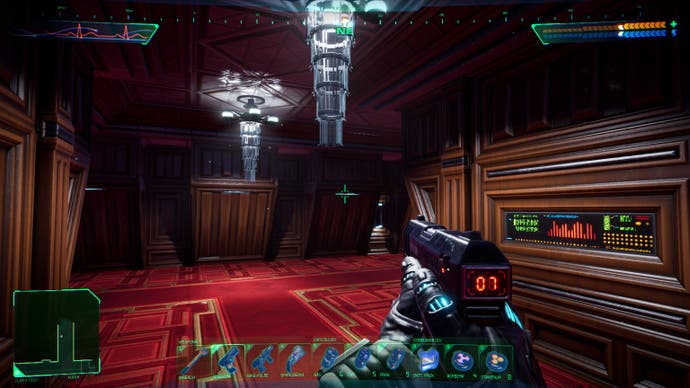
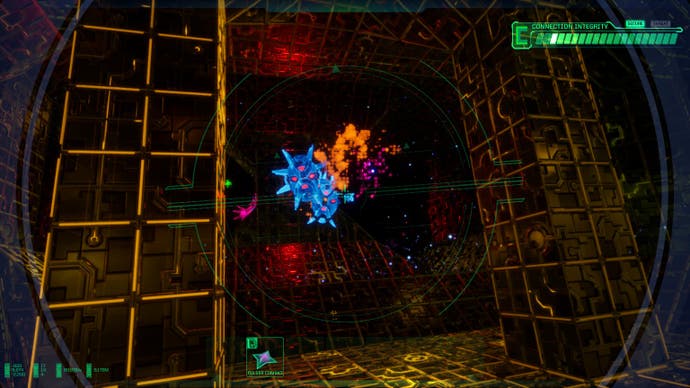
Overall, there are some new and old annoyances in this remake, mixed in with some new and old pleasures. And the crux of those pleasures comes from SHODAN, a villain that's so delightfully wicked and creative, it almost makes the whole game. The AI literally is the whole game. Citadel and SHODAN are now one and the same thing - think of the Citadel as the body and SHODAN as the brain. That means when you're stalking through the station, you're also walking through SHODAN's innards which creepily reframes all the visible pipes and creaking noises throughout the place.
System Shock leans into this horror, hard. Audiologs constantly remind you about this relationship between technology and our environment, from the enemy cyborgs that repeat "nothing" in a monotone voice, to SHODAN itself. The maniacal AI is always there. It is the ship, and it'll celebrate your small victories with deadly traps, sly remarks, and hidden alternate plans. I was constantly surprised by the way SHODAN manipulated the world, either by disabling a bridge from under me or by opening up doors to more baddies.
And, oh boy, the voice. It cracks and contorts in genuinely unsettling ways. Weird static effects sometimes make it sound like it's crying, or someone else is screaming. Inflections simulate curiousity, small moments of joy, something vaguely human. Quickly followed by casually ultraviolent threats. And every ugly part of this station is a reminder of the greed needed to create something so evil. What a marvel.
SHODAN is what makes parts of this game truly special, even with some warts. Thankfully, the original's impenetrable Excel sheet menus are gone. But Nightdive doesn't take the Capcom or Square Enix approach with this remake; they're actually pretty uncompromising in their mission to update the original. As a result, there aren't any wildly dynamic abilities or playful ways to move around the station (a la Prey) that some newbies might expect. But ultimately, the System Shock remake faithfully recreates a classic, retains most of its appeal, reframes everything with a horror tilt, and as a result, makes it more playable for everyone.







